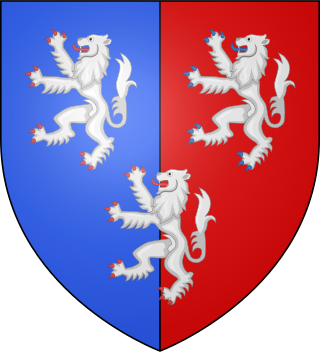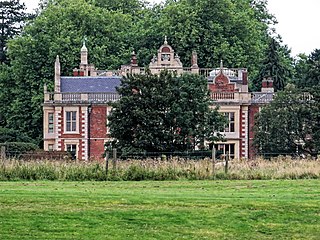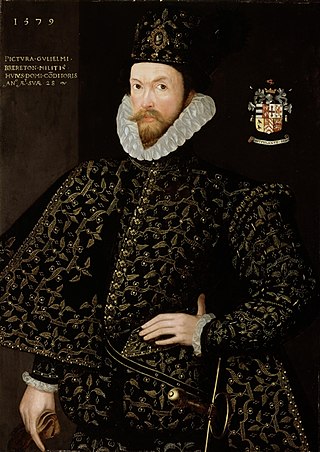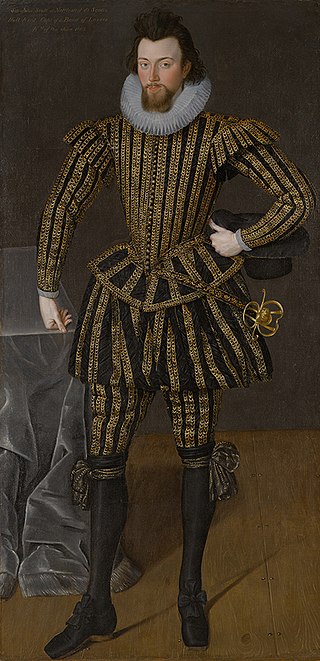Related Research Articles
Sir Richard Baker was a politician, historian and religious writer. He was the English author of the Chronicle of the Kings of England and other works.

Sir Edward Herbert of Aston in Montgomeryshire, was an English lawyer and politician who sat in the House of Commons at various times between 1621 and 1641. He was Attorney-General under King Charles I.

John Guy was an English merchant adventurer, colonist and politician who sat in the House of Commons from 1621 to 1624. He was the first proprietary governor of Newfoundland Colony, the first attempt to establish a colony on Newfoundland.
John Kay may refer to:
Sir Thomas Moulson (1582–1638), an alderman and member of the Grocers' Company, was a Sheriff of London in 1624 and Lord Mayor of London in 1634. He represented the City of London as a Member of Parliament in 1628.

Catherine Carey, after her marriage Catherine Knollys and later known as both Lady Knollys and Dame Catherine Knollys,, was chief Lady of the Bedchamber to Queen Elizabeth I, who was her first cousin.

The Court of Wards and Liveries was a court established during the reign of Henry VIII in England. Its purpose was to administer a system of feudal dues; but as well as the revenue collection, the court was also responsible for wardship and livery issues.
The Brandlings of Newcastle were a wealthy family of merchants and land and coal owners in Newcastle upon Tyne and Northumberland.

Sir Thomas Barrington, 2nd Baronet, 1585 to 18 September 1644, was an English politician and Puritan activist who sat in the House of Commons at various times between 1621 and 1644. In the early stages of the First English Civil War, he helped establish the Eastern Association, one of the most effective elements of the Parliamentarian army.
Sir Nicholas Bacon, 1st Baronet, of Redgrave, Suffolk, English Member of Parliament. In 1611 he became the first man to be made a baronet. Bacon would serve on many commissions. The Privy Council constantly called upon him to conduct inquiries. He was a puritan leader in Suffolk. The power and prestige of the puritan ministries in many areas of the country owed their power to Bacon. Sir Nicholas Bacon was considered a good Christian by his contemporaries. Especially his chaplain, Robert Allen. Robert Allen stated that Sir Bacon's wife was dedicated to "God's holy religion and worship by every good and Christian means in the sight of men."
Sir William Godolphin (1567–1613), of Godolphin in Cornwall, was an English knight, soldier, and politician who sat in the House of Commons from 1604 to 1611.
Sir Henry Wallop of Farleigh House, Hampshire was an English politician who sat in the House of Commons variously between 1597 and 1642.

The 4th Parliament of King James I was the fourth and last Parliament of England of the reign of James I of England, summoned on 30 December 1623, sitting from 19 February 1624 to 29 May 1624, and thereafter kept out of session with repeated prorogations, it was dissolved on the death of the King on 27 March 1625. The Speaker of the House of Commons was Sir Thomas Crewe, the member for Aylesbury.
Sir James Thynne was an English landowner and politician who sat in the House of Commons in two periods between 1640 and 1670.

William Brereton, 1st Baron Brereton was an English politician who sat in the House of Commons at various times between 1597 and 1622. He was created a peer in the Peerage of Ireland in 1624 as Baron Brereton.
Sir Daniel Norton was an English landowner and politician who sat in the House of Commons at various times between 1621 and 1629.
Sir Thomas Fleming was an English landowner and politician who sat in the House of Commons at various times between 1601 and 1622.
George Garrett or Garrard was an English Member of Parliament.

Sir John Scott was an English soldier and politician, and Member of Parliament (MP).

Benjamin Culme (1581-1657), Doctor of Divinity, was an English Anglican clergyman who served as Dean of St Patrick's Cathedral, Dublin, Ireland, from 1625 until 1649.